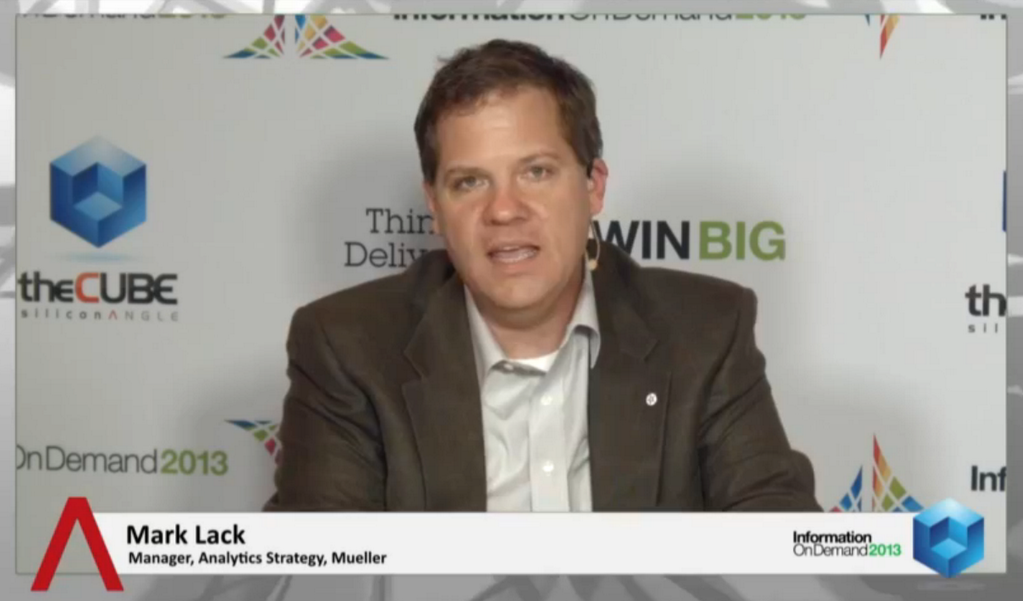 NEWS
NEWS
 NEWS
NEWS
 NEWS
NEWS
![]() Mark Lack, Manager of Analytics Strategy and Business Intelligence with Mueller, was interviewed by John Furrier and Dave Vellante, theCUBE co-hosts, during the IBM Information on Demand 2013 in Las Vegas.
Mark Lack, Manager of Analytics Strategy and Business Intelligence with Mueller, was interviewed by John Furrier and Dave Vellante, theCUBE co-hosts, during the IBM Information on Demand 2013 in Las Vegas.
Mueller is a company that specializes in the balanced scorecard methodology, a tactic reviewed in depth during this segment. Lack was a huge supporter of the idea, and he got familiar with the notion when he was in graduate school. Lack worked on a thesis about using the balanced scorecard in a corporate environment. He was convinced that the balanced scorecard might be a good way to manage through times of turbulent changes, so he had the opportunity to implement and test this after he started working with Mueller.
“We were able to translate our Mission vision and values into operational terms so that the rest to the organization would have something that they could be measured upon in terms of their input to executing our company strategy. In about 2003-2004 we implemented the balanced scorecard and we’ve been using it ever since,” explained Lack.
“One of the great things about the scorecard is that it communicates throughout the organization the lines of action, but one of the risks is that if you get the strategy wrong you can be really good at implementing a bad strategy,” warned Vellante. “Did you factor that in?”
“We talked about that and we could have had the perfect strategy and not been able to execute it, or we could have a mediocre strategy and be excellent in executing it. And we all took a mediocre strategy that we can excellently execute any day of the week. The challenge you have is getting it right,” said Lack.
“When you talk about corporate change, the dynamics that happen there warn that you should be very careful and not try to turn the ship too quickly,” Lack continued. “The balanced scorecard allowed us to identify those key drivers and those key items that we needed to do to satisfy the end-user market. By focusing the organization on those aspects it helped us to work in concert, together, so that we didn’t have goals from one part of the organization that were competing against another part. We’re all in it for the end-use customer but, more importantly, we had clarity in communications – so that everybody in the organization knew exactly what was expected, where we were headed and how was it supposed to be done.”
Vellante agreed: “Another great thing about the balanced scorecard is that it’s highly flexible by design. It also helps having tools to manage things.”
“When we go into the balanced scorecard, we realized very quickly that we needed to automate it; we needed to find a way to communicate the expectations beyond just some pictures or some Excel worksheets, so we had a process for planning with a process for the balanced scorecard and we also had a process for reporting,” said Lack. “Cognos allowed us to bring those three processes together into a single platform. We found out very quickly that we needed to add an analytics level in reporting to give people the details they needed to make meaningful changes.”
Vellante picked up on that idea, highlighting that, “if you don’t have the systems to be able to drill down and understand and actually see what the outcome is, then you really can’t affect the change; you know what’s wrong but you can’t fix it.”
“People are creatures of habit. When Brian Dan Porter, CEO, got in from the group and said ‘We’re gonna change; change is inevitable. If we don’t change, we’re gonna die. We have to continually reinvent ourselves in order to stay ahead of the competition and to provide value to our customers.’ So he really set the tone that change is important to maintain the organization, but also for future growth,” recalled Lack.
“How has the age of Big Data changed the whole balanced scorecard industry?” asked Vellante.
“I really think that Big Data is going to push resurgence within the balanced scorecard. We’re creating more and more data every day and we have to identify what that data is telling us. The future value that we’re getting from today’s data is what’s going to predict the future. The balanced scorecard is able to digest all with this Big Data to give us the insights we need to perform better in the future,” stated Lack.
Giving proper credit, Vellante concluded that “a lot of companies have succeeded as a direct result of implementing that methodology.”
THANK YOU